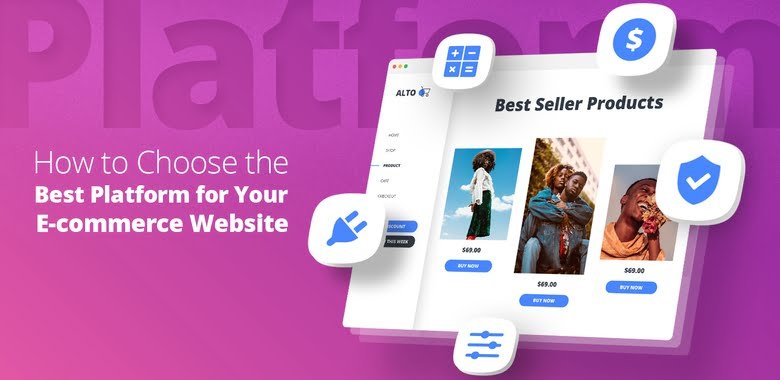The modern client is online, and if a business wants to compete, it must accommodate that customer. Consumers, business owners, and employees have all benefited and faced obstacles as a result of this transformation.
Online papers and screen sharing have replaced briefcases full of crumpled material. The conference room has been replaced with any room where you can video chat. Regardless of the advantages and disadvantages of Facebook Workplace, similar solutions are becoming the norm.
So in this blog post, we will learn how to choose the best platform for an eCommerce website. Let’s start from here:
What is E-commerce?
Whether it’s spelled with a hyphen (e-commerce), without a hyphen (eCommerce), or even with a capital letter thrown in here and there (E-commerce, e-Commerce). The word always leads to the same definition: electronic commercial transactions over the internet.
E-commerce (electronic commerce) refers to the buying and selling of goods and services over an electronic network, most often the internet, as well as the transmission of payments and data. B2B, B2C, C2C, and C2B transactions are all feasible.
The terms “e-commerce” and “e-business” are commonly interchanged. E-tail also refers to the transactional processes involved in online retail shopping.
Important:- Why is Web Security Essential For Your Ecommerce Business in 2022?
The widespread use of e-commerce platforms like Amazon and eBay has helped drive tremendous development in online retail over the last decade.
What is an E-commerce Platform?
An eCommerce platform is a software that enables businesses to create, host, and manage online stores. Modern eCommerce platforms, which are required for any online business, will allow for the seamless integration of front-end (what customers see) and back-end processes (all the behind-the-scenes things like payments, delivery, and stock management).
Best E-Commerce Platforms:
- WIX: This is the greatest option for small online stores.
- SHOPIFY: Best for Larger Business.
- ECWID: Suitable for beginning with a free plan and then expanding.
- SQUARE: for both in-person and online sales.
- WOOCOMMERCE: to add a shopping cart to a WordPress site that already exists.
- BIGCOMMERCE: For a completely online business, this is the ideal option.
- BIG CARTEL: The finest for self-employed artists.
How to Choose an E-commerce Platform?
It is not a good idea to choose an e-commerce platform solely on its popularity. The truth is that the greatest eCommerce platform is the one that helps you achieve the goals and objectives you have established for your company.
While there are an unlimited amount of e-commerce platforms to choose from, there are techniques to narrow the field for your online business. Take guidance from a top-notch expert in any E-Commerce Website Development Company in the USA to get more help and assistance.
When looking for an eCommerce platform, check for the following features:
1) Easy Shop Setup
Choose a platform that is easy to customize and set up. If you want to convey the sense of your brand correctly, have a look at the different templates each platform offers. Templates are great because they save you money by eliminating the need for outside aid (which may be costly!). They don’t require you to be a design genius to achieve a professional look and make a compelling statement.
2) Strong Catalog
The heart of your inventory is your product catalog. Examine whether the catalog is simple to update and navigate. However, more significantly, see if the product catalog satisfies the needs of your industry.
For example, if you work in the fashion or clothing industry, your product catalog must include a function that allows your customers to choose a product’s size or color. Product bundles and cross-linking between product pages are two more examples.
3) User-Friendly Website Hosting
More than 60% of designers say they work on a website for 11 to 40 hours before it’s ready to publish for their clients. And for a business owner with little to no experience in web design and development, this can seem like a daunting task. That is why it’s critical to choose a platform that includes an easy-to-use eCommerce website builder as well as a large number of free themes in non-proprietary languages.
4) Customer Review System
Customer review systems built into your website or third-party integrations that allow for customer ratings and reviews can have a significant impact on your conversion rate. According to one study, positive evaluations improve consumer trust by 72 percent, with Millennials trusting user-generated content 50 percent more than any other medium.
5) Security
When you run an online store, you are dealing with sensitive data like client addresses, credit card numbers, and other payment information, and you must protect it. If you don’t follow PCI Compliance rules, you risk getting fined, losing your ability to accept payments, losing client confidence, and other fraud-related financial penalties.
Learn More:- Best Shopify Design Themes To Engage Customers
And other platforms’ bare-bones offerings may not be sufficient. Although many systems come with an SSL certificate, appropriate protection may necessitate the deployment of third-party software or an increase in in-house infrastructure.
6) Seo Friendly
When people are looking for a specific product or service, such as what you sell, it should be straightforward for them to find your store. If you are a small online shop or a new eCommerce site, you will want to make sure your online store appears high in search results.
To do so, look for an SEO-friendly eCommerce platform that lets you use your domain name, add a blog, and collect customer reviews, all of which will naturally direct customers to your store.
7) Hosting Environment
Your hosting environment is a web-hosting platform that hosts an eCommerce website and contains features like payment processing, security measures, SSL, shopping cart software, and more.
You will need to locate the best host to fit all of your needs based on your traffic, site size, budget, web development experience, and the number of products you are selling. Especially if your online store is your primary source of revenue.
8) Flexible Pricing and Shipping
You will want to run promotions, specials, and discounts with ease, but that’s not all. Another factor to consider is multi-currency support, as well as the possibility of charging various rates for different geographical locations.
Read:- What Are Important Things For Attractive Ecommerce Web Development?
In recent years, shipment demands have shifted dramatically. The customer expects items to be delivered the same day or the next day. Ascertain if the platform is well-supported by a reputable distribution and logistics firm.
Final Words:
When it comes down to it, there is no such thing as a one-size-fits-all platform; instead, you should choose the e-commerce platform that best meets your eCommerce needs. Every business has various eCommerce demands, whether it’s more payment methods, drop-shipping capabilities, real-time inventory management, or a user-friendly interface.
So, the “best” platform for you will be the one that suits your requirements. Take your time weighing your alternatives. And don’t be hesitant to use free trials to try out each platform’s distinct features and benefits. Now, we believe that you are definitely aware of how to choose the best platform for an eCommerce website after reading this entire article.




